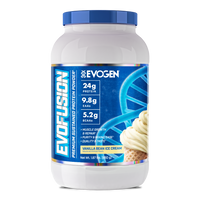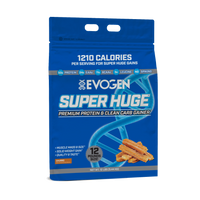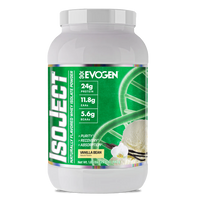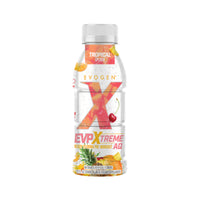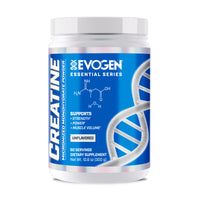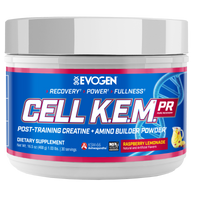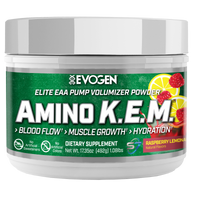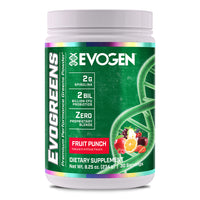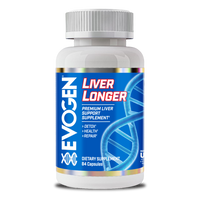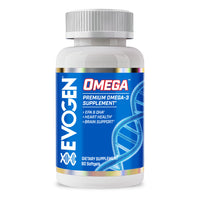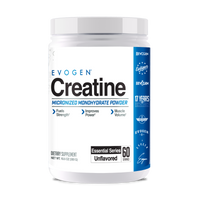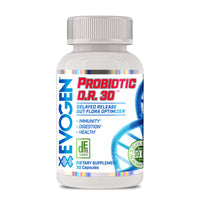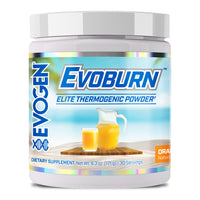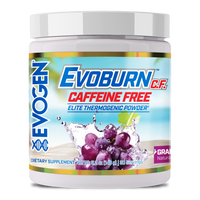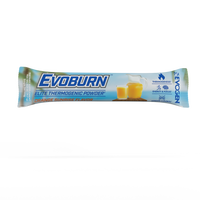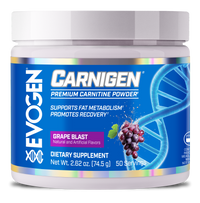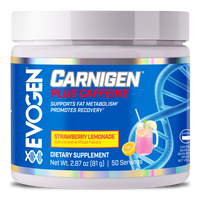The benefits of creatine for women go far beyond the gym. Women often overlook one of the most effective supplements for physical and mental performance: creatine. Studies show that women who take creatine can experience up to 15% greater strength gains compared to those who don’t. Despite outdated myths about “bulking up” or water retention, creatine offers unique advantages that enhance energy, focus, and endurance.
Products like Evogen’s creatine monohydrate provide a clean, research-backed way to increase strength, power, and recovery, all without unnecessary fillers or stimulants. Research indicates, women naturally have 70–80% less creatine stored in their muscles compared to men, which means supplementation may represent a greater uplift in some female athletes.
How Creatine Boosts Muscle Strength
Creatine fuels your muscles with the energy needed for high-intensity training. When taken regularly, creatine phosphate regenerates adenosine triphosphate (ATP), allowing your body to maintain power during short bursts of effort. This process helps you complete those final reps or sprint intervals that drive real progress.
Women who consistently take creatine monohydrate see noticeable improvements in muscle performance within 8 to 12 weeks. These results are not about “bulking” but about optimizing intracellular hydration, which supports protein synthesis and a leaner, more defined appearance.
Creatine In Resistance Training
When combined with resistance training, creatine helps women develop lean muscle mass faster while minimizing muscle damage. This synergy enhances overall exercise performance and allows you to recover quickly between sessions.
Benefits Of Combining Creatine With Strength Training
- Improves muscle mass, growth, and tone
- Increases training volume and endurance
- Reduces post-workout muscle soreness
- Enhances muscular strength across all major lifts
Pair your creatine with Evogen’s EVP-3D non-stim pre-workout for enhanced focus and pump, and Evogen’s Amino K.E.M. EAAs for muscle recovery support. Together, they amplify the benefits of creatine for women seeking elite performance.
The Science Behind Creatine Supplementation
Creatine is made from three amino acids: arginine, glycine, and methionine. Although your body produces it naturally, supplementation significantly boosts your creatine phosphate levels, leading to improved ATP regeneration during intense workouts and mental effort.
Why Women Benefit More From Creatine
- Women often have lower creatine stores, so supplementation leads to greater performance gains.
- Studies in sports medicine show improved lean muscle mass, mental focus, and exercise endurance in women.
- Supplementing creatine helps balance energy levels during low-estrogen phases, reducing fatigue and supporting hormonal health.
How Creatine Affects Women’s Metabolism And Energy Efficiency
Creatine supplementation doesn’t just build muscle mass; it also enhances how efficiently your body uses energy. Every time you train, your cells rely on adenosine triphosphate (ATP) to power movement. When ATP runs out, fatigue sets in quickly. Creatine helps by recycling ATP faster, allowing you to push through those extra few reps or minutes of intense effort.
Improved Energy Metabolism for Female Athletes
For women, this boost in creatine phosphate levels makes workouts feel more manageable and productive, especially during resistance training. Consistent use of creatine monohydrate supports steady energy and reduces mental fatigue, even on non-training days.
Creatine Benefits Beyond the Gym
This metabolic advantage doesn’t just help with exercise performance. It also supports cognitive function, mood regulation, and overall vitality. As a result, creatine has become a foundational dietary supplement for female athletes and healthy adults aiming to optimize physical and mental output.
How Creatine Supports Recovery
The real growth happens between workouts. Creatine helps reduce muscle damage markers such as creatine kinase and supports muscle cell hydration, which accelerates repair.
Women taking creatine supplements often report less muscle soreness and faster recovery times, allowing them to train more frequently without overtraining. Over weeks, this increased consistency leads to visible changes in strength, stamina, and muscle definition.
The Role Of Creatine In Muscle Recovery And Growth
Muscle recovery is one of the most underrated aspects of training success. After a tough workout, your body needs to repair microscopic muscle damage. Creatine supplementation enhances this process by increasing muscle cell hydration, allowing nutrients to enter more efficiently.
Evogen’s approach to recovery and performance stems from the expertise of 25x Olympia-winning coach Hany Rambod, whose training philosophy emphasizes consistency, science, and precision at every stage of an athlete’s journey.
How Creatine Supports Muscle Repair
It also helps lower inflammation markers that can slow recovery. Over time, this leads to greater muscle mass and strength, less soreness, and better long-term progress.
Key benefits include:
- Faster recovery between workout sessions
- Reduced muscle damage
- Enhanced muscle mass and tone
The Effects Of Creatine On Exercise Performance
For female athletes and fitness enthusiasts, creatine is one of the most well-studied sports nutrition supplements for improving athletic performance. It’s especially effective for high-intensity exercise where the body relies on the phosphocreatine energy system.
Key Benefits for Performance
- Increases power output and short-burst performance
- Enhances muscular endurance in repeated sets
- Improves recovery rate between training sessions
- Boosts cognitive performance under physical fatigue
By maintaining muscle creatine levels, you’ll notice longer-lasting strength and reduced fatigue during demanding training cycles.
How Creatine Fuels Energy Production
Your muscles and brain both rely on ATP for energy. During intense activity, ATP stores deplete quickly. Creatine helps regenerate ATP through the phosphocreatine system, providing a rapid energy reserve that powers muscle cells during training.
Because women often have lower baseline creatine levels, the impact of supplementation is even more significant. You’ll feel stronger, more focused, and able to sustain high-intensity exercise longer without fatigue.
Creatine And Bone Density
Maintaining bone mineral density is crucial for long-term health, especially during menopause when estrogen levels decline. Creatine supplementation, combined with weight training, helps stimulate bone formation and slow down age-related bone loss.
How Creatine Supports Bone Strength
- Activates osteoblasts (bone-building cells) and reduces osteoclast activity (bone breakdown)
- Enhances muscle strength, improving the mechanical stress that strengthens bones
- Supports joint health and overall mobility in postmenopausal women
For a complete post-workout recovery stack, combine Evogen’s IsoJect protein with your daily creatine for better muscle and bone health.
Does Creatine Affect Women's Hormone Health?
Hormonal fluctuations affect muscle growth, recovery, and overall energy metabolism. While creatine doesn’t alter sex hormones, it helps maintain energy balance when estrogen levels drop.
Benefits During Hormonal Transitions
- Reduces fatigue during PMS and perimenopause
- Helps preserve muscle strength during menopause
- Stabilizes mood and mental focus through improved cellular energy
Creatine is particularly valuable for women with insufficient estrogen levels, helping offset hormonal dips that impact athletic performance and mental clarity.
How Creatine May Help During Menstrual Cycles
Many women notice that their exercise performance fluctuates throughout the month. The hormonal changes during the menstrual cycle can influence muscle performance, energy levels, and recovery ability. Research suggests that creatine use during low-estrogen phases (especially the luteal phase) helps counteract these dips by stabilizing creatine phosphate levels in muscle cells.
During menstruation, women often experience fatigue, dehydration, and reduced endurance. Taking creatine supplements daily maintains cellular energy and reduces perceived exertion, allowing for consistent training output.
In the follicular phase, when estrogen levels peak, creatine works synergistically with natural hormonal boosts, further improving muscle strength and exercise performance. Tracking your cycle and using creatine consistently throughout the month can help create more balanced energy, improve mood, and sustain motivation even during lower-energy phases.
Cognitive Function And Brain Health
Your brain uses nearly 20% of your body’s total energy, relying on creatine phosphate to sustain performance. For female athletes, this cognitive support can be the difference between mental fatigue and sustained focus during competition. Supplementation helps increase mental clarity, memory, and problem-solving, especially under stress or fatigue.
Additional Cognitive Benefits
- Reduces mental fatigue during intense tasks
- Supports neurotransmitter balance and brain recovery
- May reduce symptoms of major depression in women
How Creatine May Support Women’s Mental Health
Beyond muscle and performance, creatine may support mental health by improving energy metabolism in brain cells. Women are statistically more prone to major depression, particularly during hormonal transitions like postpartum or menopause. Early research shows creatine supplementation enhances brain energy availability, which may positively influence mood and cognitive resilience.
Creatine assists the brain in managing high-stress situations by supporting neurotransmitter regulation and improving blood flow to the brain. These benefits make it especially useful for women experiencing burnout or high mental load from work, family, or training demands.
How To Take Creatine Safely
Creatine monohydrate is one of the most researched dietary supplements in the world and is considered safe for long-term use in healthy adults.
Dosing Guidelines
- Daily use: Take 3–5g of creatine monohydrate per day, consistently, to maintain optimal muscle stores.
- Hydration: Drink extra water to support muscle cell hydration and recovery.
- Optional loading phase: Some may choose to “load” creatine by taking 20g daily (split into four 5g servings) for 5–7 days to saturate muscles more quickly, but this step isn’t necessary. You’ll reach the same benefits over time with daily use alone.
You can mix creatine with whey protein or a carbohydrate source post-workout to enhance absorption and recovery. Consistency is the key to seeing results.
How To Choose The Right Creatine Supplement
Not all creatine supplements are created equal. The gold standard remains creatine monohydrate, which has the strongest research backing and the highest absorption rate. Look for micronized powder forms for better solubility and fewer stomach issues.
Women new to supplementation should avoid blends with added stimulants unless specifically needed for pre-workout energy. Instead, focus on pure creatine paired with products that complement recovery.
If you prefer convenience, creatine powder mixes easily into smoothies, shakes, or even plain water. Always check that your supplement is third-party tested for purity and potency to ensure quality and safety.
Health Benefits Beyond Performance
Creatine’s benefits extend beyond fitness. It supports heart health, improves metabolic function, and helps maintain skeletal muscle during calorie deficits or inactivity.
Other Proven Health Benefits
- Enhances hydration and thermoregulation
- Supports cellular repair and metabolic function
- Contributes to long-term sports performance and muscle preservation
Creatine And Long-Term Health Benefits For Women
While most women take creatine to improve athletic performance, its benefits extend into long-term health. Research suggests that creatine supports bone density, muscle preservation, and brain function as women age. It can help offset age-related declines in skeletal muscle and bone mass, two factors crucial for preventing injury and maintaining independence later in life.
In postmenopausal women, combining creatine supplements with weight training results in greater improvements in muscle strength and bone mineral density than exercise alone. This makes creatine a cornerstone of healthy aging for active women who want to stay strong, mobile, and confident through every stage of life.
Level Up Your Training With Creatine
The benefits of creatine for women reach far beyond the gym. From building muscle mass and maintaining bone density to boosting cognitive function and hormonal balance, creatine monohydrate remains one of the most proven tools for lasting strength and vitality.
You don’t need complicated loading cycles to experience results, just consistency. Taking 3–5 grams daily supports energy, recovery, and overall exercise performance through every stage of life.
If you’re ready to push past plateaus, pair your daily creatine with Evogen’s IsoJect for recovery, Amino K.E.M. for endurance, and EVP-3D for focus and performance. Together, these science-backed formulas help you perform, recover, and feel your best, inside and outside the gym.

